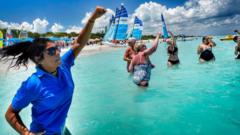The article text:
As Canadian "snowbirds" begin planning their winter getaways to escape North America's freezing temperatures, Cuba remains a perennial favorite due to its inviting beaches, particularly the pristine resorts of Varadero. This demographic has consistently served as a crucial lifeline for the Cuban tourism industry, especially in light of diminished American travel resulting from the enduring U.S. economic embargo.
Statistics reveal that nearly a million Canadians flocked to Cuba last year, making them the largest group of foreign visitors. However, recent actions taken by Sunwing Vacations Group—an important Canadian tour operator and partner in Cuba—indicate a potential shift. In response to widespread blackouts affecting the island caused by deteriorating energy systems, Sunwing has removed 26 hotels from its offerings, a decision underscoring the challenges that beset Cuba's hospitality sector.
The blackouts began notably at the end of October and continued with further cuts during Hurricane Rafael, which exacerbated ongoing energy difficulties. Such disruptions have raised alarms about the comfort and safety of potential travelers, according to Sunwing's chief marketing officer, who emphasized the need for alternative suggestions to reassure their clientele.
Cuba's economy relies significantly on tourism, which not only serves as a vital foreign currency source but also sustains numerous jobs across the island. The recent performance of the tourism sector is crucial, especially as the Cuban Tourism Board pushes messages of resilience, emphasizing preparations for the winter season and improvements in services.
Nonetheless, the stakes are complicated further by impending U.S. political developments. The specter of Donald Trump's return to the presidency poses a threat as he has previously embraced stringent anti-Cuba policies, particularly through collaboration with influential figures like Senator Marco Rubio. Observers suggest that Trump's potential reelection, aligned with Rubio's hardline stance, could lead to increased sanctions that would further cripple the already struggling tourism industry.
Former Cuban diplomat Jesús Arboleya voiced concerns over the current state of affairs, illustrating the significant pressures Cubans face amid potential policy shifts in the U.S. Meanwhile, Cuban commentator Rafael Hernández emphasized the contradictory nature of American policy—seeking support for private sectors while simultaneously stifling broader economic reforms.
With tourism having plunged dramatically following the rollback of Obama-era engagement strategies and subsequent impacts from Covid-19, Cuba's once-bustling tourist scene is now in dire straits. Extensive investments in international tourism's infrastructure, which have previously comprised the bulk of government spending, raise questions about the lack of similar attention to energy resources, a critical component for supporting tourism services.
Despite the current adversities, travelers still find Cuba's rich cultural tapestry, historic landscapes, and iconic imagery enticing. That said, as the situation continues to evolve amidst the potential fallout from U.S. political machinations and ongoing energy crises, the tourism sector remains on precarious ground. If changes in Washington align with further discontent in Cuba, the implications for its tourism industry could be severe, underscoring the urgent need for resilient strategies moving forward.
As Canadian "snowbirds" begin planning their winter getaways to escape North America's freezing temperatures, Cuba remains a perennial favorite due to its inviting beaches, particularly the pristine resorts of Varadero. This demographic has consistently served as a crucial lifeline for the Cuban tourism industry, especially in light of diminished American travel resulting from the enduring U.S. economic embargo.
Statistics reveal that nearly a million Canadians flocked to Cuba last year, making them the largest group of foreign visitors. However, recent actions taken by Sunwing Vacations Group—an important Canadian tour operator and partner in Cuba—indicate a potential shift. In response to widespread blackouts affecting the island caused by deteriorating energy systems, Sunwing has removed 26 hotels from its offerings, a decision underscoring the challenges that beset Cuba's hospitality sector.
The blackouts began notably at the end of October and continued with further cuts during Hurricane Rafael, which exacerbated ongoing energy difficulties. Such disruptions have raised alarms about the comfort and safety of potential travelers, according to Sunwing's chief marketing officer, who emphasized the need for alternative suggestions to reassure their clientele.
Cuba's economy relies significantly on tourism, which not only serves as a vital foreign currency source but also sustains numerous jobs across the island. The recent performance of the tourism sector is crucial, especially as the Cuban Tourism Board pushes messages of resilience, emphasizing preparations for the winter season and improvements in services.
Nonetheless, the stakes are complicated further by impending U.S. political developments. The specter of Donald Trump's return to the presidency poses a threat as he has previously embraced stringent anti-Cuba policies, particularly through collaboration with influential figures like Senator Marco Rubio. Observers suggest that Trump's potential reelection, aligned with Rubio's hardline stance, could lead to increased sanctions that would further cripple the already struggling tourism industry.
Former Cuban diplomat Jesús Arboleya voiced concerns over the current state of affairs, illustrating the significant pressures Cubans face amid potential policy shifts in the U.S. Meanwhile, Cuban commentator Rafael Hernández emphasized the contradictory nature of American policy—seeking support for private sectors while simultaneously stifling broader economic reforms.
With tourism having plunged dramatically following the rollback of Obama-era engagement strategies and subsequent impacts from Covid-19, Cuba's once-bustling tourist scene is now in dire straits. Extensive investments in international tourism's infrastructure, which have previously comprised the bulk of government spending, raise questions about the lack of similar attention to energy resources, a critical component for supporting tourism services.
Despite the current adversities, travelers still find Cuba's rich cultural tapestry, historic landscapes, and iconic imagery enticing. That said, as the situation continues to evolve amidst the potential fallout from U.S. political machinations and ongoing energy crises, the tourism sector remains on precarious ground. If changes in Washington align with further discontent in Cuba, the implications for its tourism industry could be severe, underscoring the urgent need for resilient strategies moving forward.



















